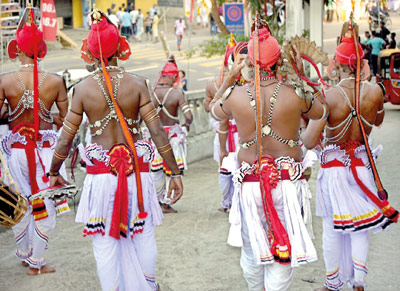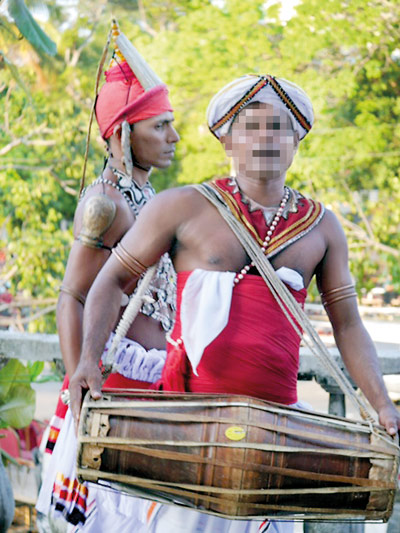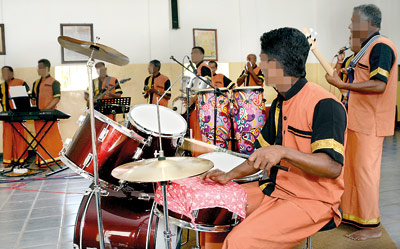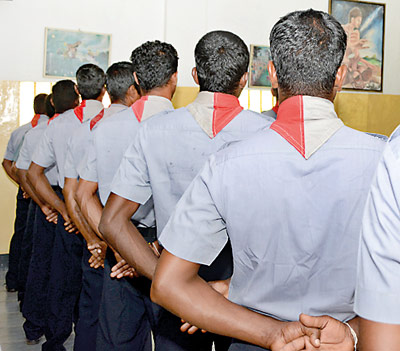Within these walls performers are born

All performers at the end of the day (above and below left): Taking part in the Gangaramaya’s Navam Perahera Pix by Tilak Samarawickrema
When I go out of prison for a performance I don’t feel like I’m going out as a prisoner. I feel like I’m going out as an artist, and for people like us that is immense. At least for a while no one knows that we’re prisoners; no one looks at us with judgement. We’re just performers, entertaining.
When architect and designer Tilak Samarawickreme shared with the Sunday Times his chance meeting with dancers from the Welikada Prison at the recently concluded Navam Perahera, we were intrigued. A visit to the prison in pursuit of more information about this troupe revealed that inside the walls of Welikada Prison life is not quite as one might imagine it to be. A rehabilitation programme focused on the arts has drawn out–sometimes unexpectedly–the hidden talents of the inmates.
We’re really here to learn more about the dancing troupe, but Senior Superintendent of Police (SSP) Chandana Ekanayake can’t help but enthuse about the prison’s music and scout programmes as well. We’re meeting him on a very busy day, but he takes a few moments to praise this rehabilitation programme which was in effect long before he took over as SSP in charge of Welikada earlier this year. “It’s a very extensive programme,” he notes. “We have a lot of training and personal development programmes inside the prison to keep our inmates occupied, and to better their chances in the future.”

Welikada is a maximum security prison and it is also Sri Lanka’s largest. Currently, the prison holds just over 3000 inmates. It is overcrowded (Welikada was built in 1841 by the British colonial government) and has been riddled with controversy over the decades. Like many other prisons around the world it also faces the problem of returnee inmates- many former inmates return inside the walls of the prison for committing another crime (sometimes a similar crime for which they were convicted earlier). The rehabilitation programmes inside the prison aim to rectify this situation- by providing vocational and arts training to inmates the authorities hope to reduce the chance of unemployment and disillusionment once they leave prison. Similar programmes are in operation at the female ward, and in several other prisons around the country.
The dance programme was introduced in 1982 at the suggestion of Pani Bharata, a master dancer and drummer from Algama, to then Commissioner of Prisons J.P. Delgoda. It was A.D. Jinadasa Nivithigala- Nivithigala Gurunnanse-who volunteered to instruct the prisoners. In a 2012 interview with the Sunday Times he said of his first class-“Puduma bayak thibbe. Tikak kal giyama huru una (I was terrified at the start but soon got used to it).”
Now officially registered with the Department of Cultural Affairs, the Welikada prison dancing troupe specializes in the Kandyan dance form. They are currently overseen by Janaka Jayalath, an instructor, but much of the training and choreography is done with the input of the troupe members themselves. The current dance troupe is the 11th one to perform publicly since the programme was first introduced in 1982 and there are over 40 dancers actively training and/or qualified as Kandyan dancers at present. They train almost every day-until about 3 p.m., hard at work crafting and then mastering their performances.

Music to lighten their lives: The band at practice. Pix by M.D. Nissanka
Their participation at the recently concluded Navam Perahera (February 21 and 22) was at the request of the Gangarama Temple, which organizes the perahera. “Participating in a procession like this is considered a blessing. Prison inmates should also have a chance to benefit from that,” says Ven. Dr. Kirinde Assaji Thero from the temple. “We commend the prison rehabilitation programme for giving these people the opportunity to develop their talents; it’s an important step in directing them to the correct path. At the perahera they’re given the same opportunities as other dancers. After all they’re also performers at the end of the day.”
We are also greeted by a small team of the Welikada Prison’s scouts. The scout programme has been in existence from 1926, taking responsibility for a lion’s share of activities carried out in the prison. The scouts are trained in vocational activities alongside their fellow inmates as well, and contribute to assisting administration, organisation of prison events etc.
Apart from the dance troupe, the scout programme and a thriving drama ensemble the Welikada Prison is also home to an in-house musical band. Made up of 25 members, the band is fully fledged-instruments include the drums, keyboard and guitar. This band was formed in 2005 and they perform lively covers of western and eastern music, and write their own music as well. “Most of the band members had never played a note before in their lives,” says Muditha Prabath Erathne, the prison’s Rehabilitation Officer who is their unofficial mentor. Much like former members of the dance troupe, “some of our former band members have joined professional musical groups once they completed their sentence,” he shares.

SSP Chandana Ekanayake
When we visited the band treated us to a six item set that had us tapping our toes and occasionally humming along. The vocalists are disciplined and versatile-from a few gusty numbers to a more mellow love song, these singers and musicians drew in other prison inmates running their errands around the grounds to the door. Soon enough, the audience of two from the Sunday Times had been joined by a keen group of inmates who knew the words to almost every song. (The band is in need of a speaker set at present-if you would like to contribute, please contact the Prisons Department)
Both the band and the dance troupe perform at state and private events. The dance troupe that performed most recently at the Navam Perahera, also performed at the Kandy Esala perahera. They perform at private functions such as weddings and parties, and at state functions and residences. While these groups are closely monitored by prison personnel when in public, security issues have been few and far between over the years. The focus is on delivering a quality performance-it brings them a great deal of pleasure, we’re told, to be treated like professional artistes.

A scout drill


